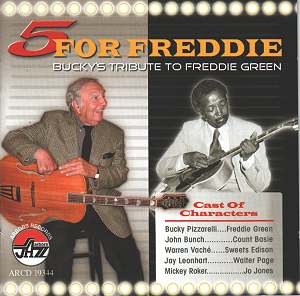1. Groovin´ High
2. Bustin´ Suds
3. For Lena and Lennie
4. Up in the Blues
5. Down for Double
6. High Tide
7. Dreamsville
8. Shiny Stockings
9. Centerpiece
10. Corner Pocket
11. All of Me
12. Sophisticated Swing
13. Lester Leaps In
Bucky Pizzarelli - Guitar
Warren Vaché - Cornet
John Bunch - Piano
Jay Leonhardt - Bass
Mickey Roker - Drums
The
Freddie in the title is Freddie Green, a mainstay
of Count Basie's rhythm section for nearly
five decades. If anybody could be said to
"Do by stealth, and blush to find it fame",
it's Freddie Green, whose rhythm guitar added
so much so discreetly to the Basie band.
The
album starts unexpectedly with Groovin'
High,
a tune never associated with Freddie Green.
The sleeve-note says that Bucky Pizzarelli
included it here because Bucky was once employed
by its co-composer, Dizzy Gillespie. In fact
it makes a fine vehicle for a bouncy jaunt
which opens in typical Basie style with sparing
piano against chugging rhythm. Warren Vaché's
solo cleverly combines touches of bebop with
echoes of the style of Basie trumpeter Harry
Edison, whose sound is recalled by Warren
on many of the tracks here.
Bustin'
Suds
is the first of five Freddie Greene compositions
on the CD, with Bucky supplying not only rhythm
guitar but also a subtle solo. For
Lena and Lennie
was written by Quincy Jones for the Basie
band in 1958 as a tribute to Lena Horne and
her husband, Lennie Hayton. Warren plays this
slowish ballad with expert taste and John
Bunch adds some equally tasteful piano. Up
in the Blues
was composed by Freddie Green for his only
album as leader - the appropriately-titled
Mr
Rhythm.
Warren Vaché's muted cornet presents the simple
theme, then John Bunch takes over, sounding
here and elsewhere on the album more extrovert
than he has sometimes appeared.
Down
for Double
and Corner
Pocket
are among Freddie Green's best-known compositions.
The former has provided a useful vehicle for
several jazzmen and here gives Jay Leonhart
a chance for a bass solo. The latter was written
for one of Basie's finest albums, April
in Paris (1955), and
gives Leonhart another solo. Drummer Mickey
Roker makes his presence felt slightly more
on this track than on others, playing throughout
with admirable restraint. The seductive Shiny
Stockings also
dates from the mid-fifties. Bucky again supplies
some splendid Greenish guitar and solos acoustically,
while John Bunch reproduces the Basie piano
style convincingly.
I won't deal with every track separately, because
a certain sameness sets in with this sequence
of tunes at gentle tempos with fairly understated
performances. But for those seeking some gently
satisfying music without too many fireworks,
this is an ideal album.
Tony
Augarde
